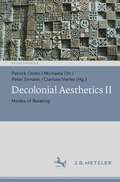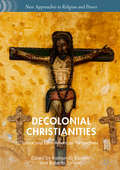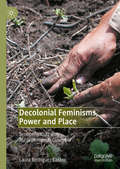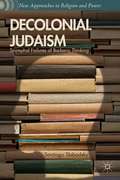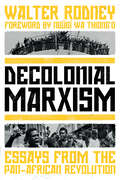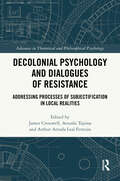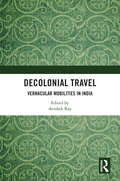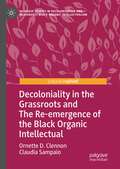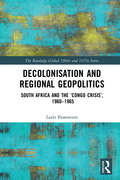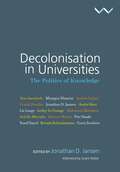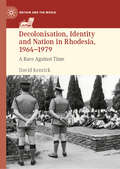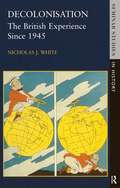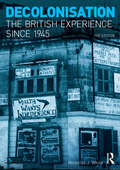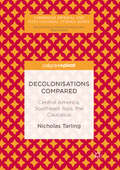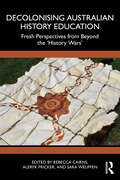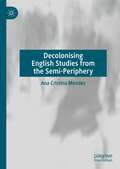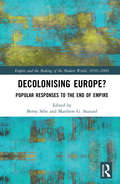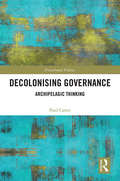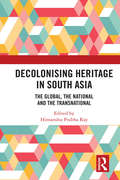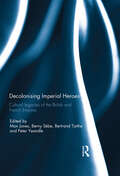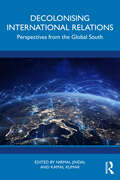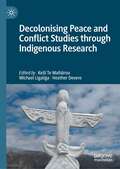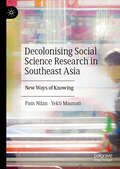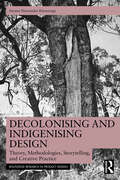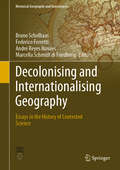- Table View
- List View
Decolonial Aesthetics II: Modes of Relating (Ästhetiken X.0 – Zeitgenössische Konturen ästhetischen Denkens)
by Michaela Ott Patrick Oloko Peter Simatei Clarissa VierkeThis book features writing by 17 authors from Germany and from African and Latin American countries on highly diverse aesthetic phenomena as seen from their own different points of view. The texts in this volume all deal with the imperative of ‘decolonization’: they try to highlight aesthetic strategies for the (re)discovery of unthematized, misappropriated, transcultural and even transcontinental histories and memories and aesthetic practices that are absent from or too little perceived within national consciousnesses. Novels, poems and musical performances from the East African region are analysed as intertwined histories of the Indian Ocean and its different languages. Artworks of the Black Atlantic and perceptions of Africa are discussed from, for example, Brazilian perspectives. Within the German context, decolonisation strategies in exhibition practices in ethnological or art museums developed by Nigerian artists are evaluated; new terms such as ‘dividuation’ are proposed to describe these contemporary composite-cultural entanglements, and so on. A stimulating, wide-ranging and heterogeneous portrait of contemporary interwoven world cultures!
Decolonial Christianities: Latinx and Latin American Perspectives (New Approaches to Religion and Power)
by Raimundo Barreto Roberto SirventWhat does it mean to theorize Christianity in light of the decolonial turn? This volume invites distinguished Latinx and Latin American scholars to a conversation that engages the rich theoretical contributions of the decolonial turn, while relocating Indigenous, Afro-Latin American, Latinx, and other often marginalized practices and hermeneutical perspectives to the center-stage of religious discourse in the Americas. Keeping in mind that all religions—Christianity included—are cultured, and avoiding the abstract references to Christianity common to the modern Eurocentric hegemonic project, the contributors favor embodied religious practices that emerge in concrete contexts and communities. Featuring essays from scholars such as Sylvia Marcos, Enrique Dussel, and Luis Rivera-Pagán, this volume represents a major step to bring Christian theology into the conversation with decolonial theory.
Decolonial Feminisms, Power and Place: Sentipensando with Rural Women in Colombia
by Laura Rodríguez CastroThis book draws on participatory ethnographic research to understand how rural Colombian women work to dismantle the coloniality of power. It critically examines the ways in which colonial feminisms have homogenized the "category of woman,” ignoring the intersecting relationship of class, race, and gender, thereby excluding the voices of “subaltern women” and upholding existing power structures. Supplementing that analysis are testimonials from rural Colombian women who speak about their struggles for sovereignty and against territorial, sexual, and racialized violence enacted upon their land and their bodies. By documenting the stories of rural women and centering their voices, this book seeks to dismantle the coloniality of power and gender, and narrate and imagine decolonial feminist worlds. Scholars in gender studies, rural studies, and post-colonial studies will find this work of interest.
Decolonial Judaism
by Santiago SlabodskyDecolonial Judaism: Triumphal Failures of Barbaric Thinking explores the relationship among geopolitics, religion and social theory. It argues that during the postcolonial and post-Holocaust era, Jewish thinkers in different parts of the world were influenced by Global South thought and mobilized this rich set of intellectual resources to confront the assimilation of normative Judaism by various incipient neo-colonial powers. By tracing the historical and conceptual lineage of this overlooked conversation, this book explores not only its epistemological opportunities, but also the internal contradictions that led to their ultimate unraveling, especially in the post-9/11 world.
Decolonial Marxism: Essays from the Pan-African Revolution
by Walter RodneyA previously unpublished collection of Rodney's essays on Marxism, spanning his engagement with of Black Power, Ujamaa Villages, and the everyday people who put an end to a colonial eraEarly in life, Walter Rodney became a major revolutionary figure in a dizzying range of locales that traversed the breadth of the Black diaspora: in North America and Europe, in the Caribbean and on the African continent. He was not only a witness of a Pan-African and socialist internationalism; in his efforts to build mass organizations, catalyze rebellious ferment, and theorize an anti-colonial path to self-emancipation, he can be counted among its prime authors.Decolonial Marxism records such a life by collecting previously unbound essays written during the world-turning days of Black revolution. In drawing together pages where he elaborates on the nexus of race and class, offers his reflections on radical pedagogy, outlines programs for newly independent nation-states, considers the challenges of anti-colonial historiography, and produces balance sheets for a dozen wars for national liberation, this volume captures something of the range and power of Rodney's output. But it also demonstrates the unbending consistency that unites his life and work: the ongoing reinvention of living conception of Marxism, and a respect for the still untapped potential of mass self-rule.
Decolonial Psychology and Dialogues of Resistance: Addressing Processes of Subjectification in Local Realities (Advances in Theoretical and Philosophical Psychology)
by James Cresswell Atsushi Tajima Arthur Arruda Leal FerreiraInterweaving rich theory on dialogism, power, and resistance together with situated scenarios addressing the production of psychological knowledge, this book explores decoloniality as it interfaces with strategic fields in psychology.Current movements in global sentiment have raised important calls for decolonial action. In this volume an international set of authors come together to critically challenge power by considering how colonial mindsets develop and are retained. Drawing on dialogism inspired by Bakhtin, Vygotsky, and other leading thinkers of dialogicality, the book focuses on dialogue and how it is tied to the ability to think in ways outside colonial mindsets. It challenges approaches that run the risk of bypassing how fundamental colonialism has become for human thinking, and incorporates visions to consider how, both conceptually and methodologically, a postcolonial or decolonial psychology can be done. In so doing, it guides readers beyond the status quo to consider a program to improve psychology, formulate a new psychological culture, and bring about discussion beyond the permanent – yet generative – tension between liberating and subordinating psychologies.The book will be key reading for theoretical and critical psychology scholars and postgraduate students, particularly those interested in community engagement and decolonizing psychology. It will also be of interest to those engaged in research in Bakhtian studies, critical theory, and power studies.
Decolonial Travel: Vernacular Mobilities in India
by Avishek RayThis volume brings together scholarship on indigenous forms of travel to decolonize travel theory. It looks at certain minoritarian-vernacular traveling cults – very rarely examined – that compel us to rethink, on the one hand, the conventional tropes of and rationales for travel; and, on the other hand, notions of (post)coloniality, nationalism and modernity in the context of India. The book illustrates the enduring problematic of the ‘colonial episteme’: how it deploys pervasive categories through which travel practices are sought to be understood, and why such categories are inadequate in accounting for the vernacular traveling cults in question. In studying the vernacular world-making in and through these cults, this book offers critical insights on how they defy the log(ist)ics of the ‘imperial categories’ and why they must be read as expressions of decoloniality. An important contribution to travel studies, the book will be an indispensable resource for students and researchers of South Asian studies, travel theory, Indian literary and cultural studies, cultural history and anthropology, sociology, and decoloniality.
Decoloniality in the Grassroots and The Re-emergence of the Black Organic Intellectual (Palgrave Studies in Decolonisation and Grassroots Black Organic Intellectualism)
by Ornette D. Clennon Claudia SampaioThis book explores the relationship between "the roles of the Black “organic intellectual” and the PoC academic scholar, and outlines how important partnerships are emerging from these sometimes-contrasting decolonial praxes. By blending the decolonial processes of Indigenous rights via a liberation Psychology lens, Brazilian critical race scholarship and UK African diasporic collective consciousness via intersectional critical race studies, the authors provide a clear theoretical framework to show how a decolonised multi-layered community epistemology can be produced by the community for the community that in praxis form, can be employed for the fight for social justice within those communities.
Decolonisation and Regional Geopolitics: South Africa and the ‘Congo Crisis’, 1960-1965 (The Routledge Global 1960s and 1970s Series)
by Lazlo PassemiersDecolonisation and Regional Geopolitics argues that as much as the ‘Congo crisis’ (1960-1965) was a Cold War battleground, so too was it a battleground for Southern Africa’s decolonisation. This book provides a transnational history of African decolonisation, apartheid diplomacy, and Southern African nationalist movements. It answers three central questions. First, what was the nature of South African involvement in the Congo crisis? Second, what was the rationale for this involvement? Third, how did South Africans perceive the crisis? Innovatively, the book shifts the focus on the Congo crisis away from Cold War intervention and centres it around African decolonisation and regional geopolitics.
Decolonisation in Universities: The politics of knowledge
by Jonathan D. JansenIn this collection of case studies and stories from the field, South African scholars come together to trade stories on how to decolonise the universityShortly after the giant bronze statue of Cecil John Rhodes came down at the University of Cape Town, student protestors called for the decolonisation of universities. It was a word hardly heard in South Africa’s struggle lexicon and many asked: What exactly is decolonisation? This edited volume brings together the best minds in curriculum theory to address this important question. In the process, several critical questions are raised: Is decolonisation simply a slogan for addressing other pressing concerns on campuses and in society? What is the colonial legacy with respect to curriculum and can it be undone? How is the project of curriculum decolonisation similar to or different from the quest for postcolonial knowledge, indigenous knowledge or a critical theory of knowledge? What does decolonisation mean in a digital age where relationships between knowledge and power are shifting?The book combines strong conceptual analyses with novel case studies of attempts to ‘do decolonisation’ in settings as diverse as South Africa, Uganda, Tanzania and Mauritius. Such a comparative perspective enables reasonable judgements to be made about the prospects for institutional take-up within the curriculum of century-old universities.
Decolonisation, Identity and Nation in Rhodesia, 1964-1979: A Race Against Time (Britain and the World)
by David KenrickThis book explores concepts of decolonisation, identity, and nation in the white settler society of Rhodesia (now Zimbabwe) between 1964 and 1979. It considers how white settlers used the past to make claims of authority in the present. It investigates the white Rhodesian state’s attempts to assert its independence from Britain and develop a Rhodesian national identity by changing Rhodesia’s old colonial symbols, and examines how the meaning of these national symbols changed over time. Finally, the book offers insights into the role of race in Rhodesian national identity, showing how portrayals of a ‘timeless’ black population were highly dependent upon circumstance and reflective of white settler anxieties. Using a comparative approach, the book shows parallels between Rhodesia and other settler societies, as well as other post-colonial nation-states and even metropoles, as themes and narratives of decolonisation travelled around the world.
Decolonisation: The British Experience since 1945
by Nicholas WhiteConcise and accessible, this guide provides an overview of the process of British decolonisation. Dr White syntheses recent historical debate by looking at the demise of British imperial power from three main perspectives: the shifting emphases of British imperial policy; the rise of populist, colonial nationalism, and the international political, strategic, and economic environment dominated by the USA and the USSR. The book also positions the British experience within the context of European decolonisation and contains many documents which have only recently become available. Introducing the reader to the key debates it the ideal introductory text on the subject.
Decolonisation: The British Experience since 1945 (Seminar Studies)
by Nicholas WhiteThis updated Seminar Study provides an overview of the process of British decolonisation. The eclipse of the British Empire has been one of the central features of post-war international history. At the end of the Second World War the empire still spanned the globe and yet by the mid-1960s most of Britain’s major dependencies had achieved independence. Concisely and accessibly, the book introduces students to this often dramatic story of colonial wars and emergencies, and fraught international relations. Although a relatively recent phenomenon, the end of the British Empire continues to spawn a lively and voluminous historical debate. Dr. White provides a synthesis of recent approaches, specially updated and expanded for this edition, by looking at the demise of British imperial power from three main perspectives the shifting emphases of British overseas policy the rise of populist, anti-colonial nationalism the international political, strategic, and economic environment dominated by the USA and the USSR. The book also examines the British experience within the context of European decolonisation as a whole. Supporting the text are a range of useful tools, including maps, a chronology of independence, a guide to the main characters involved, and an extensive bibliography (specially expanded for the new edition. Decolonisation: the British Experience since 1945 is ideal for students and interested readers at all levels, providing a diverse range of primary sources and the tools to unlock them.
Decolonisations Compared
by Nicholas TarlingThis book offers an analysis of the decolonisation process across three different regions around the world: Central America, Southeast Asia and the Caucasus. It explores how the nature of previous imperial systems shaped the nation states that were created in their stead. By outlining these contrasting historical trajectories, this short study argues that the stability of these nation states and their ability to cooperate with one another are dependent on the acceptance of the frontiers established by the previous imperial powers. It moves from Central America, left in the early nineteenth century without any clear borders and which has suffered much inter-state tension ever since, to Southeast Asia, whose clear colonial delineations have been accepted in the post-colonial order, and finally to the Caucasus where the arbitrary boundaries of the Soviet Republics have not easily translated into nation states. Offering a concise comparison of decolonisation in three regions, this book will be of particular interest to students of history, politics and international relations.
Decolonising Australian History Education: Fresh Perspectives from Beyond the ‘History Wars’
by Rebecca Cairns Sara Weuffen Aleryk FrickerThis book is the first of its kind to showcase a range of fresh and expert perspectives on decolonising history education in Australia. The research-informed chapters by First Nations and non-Indigenous educators and scholars provide guidance on applying practical strategies for decolonising learning and teaching, and moving beyond the ‘history wars’.History has long been the most contentious area of education in Australia. This book tackles the narrow and overtly politicised ‘history wars’ debates and foregrounds the need to re-examine impacts of settler-colonialism on Australia’s history. First-hand knowledge and much-needed teaching practices are presented, demonstrating how decolonisation can be put into action through Australian history education. The chapters present a range of perspectives from the early years right through to higher education settings and argues that there is an increased need for greater awareness, appreciation, and willingness to explore and engage with multiple narratives of truth-telling that are so often contested. Readers are guided to discover how this translates to classroom practice through unique, provocative, and research-informed strategies that foreground applied decolonising approaches.Combining theoretical perspectives and practical ideas, this book is an essential resource to support pre- and in-service teachers, in all education contexts, in navigating the decolonisation of Australian history education. This makes it an important contribution to local, as well as global, decolonising efforts.
Decolonising English Studies from the Semi-Periphery
by Ana Cristina MendesThis book investigates how decolonising the curriculum might work in English studies — one of the fields that bears the most robust traces of its imperial and colonial roots — from the perspective of the semi-periphery of the academic world- system. It takes the University of Lisbon as a point of departure to explore broader questions of how the field can be rethought from within, through Anglophone (post)coloniality and an institutional location in a department of English, while also considering forces from without, as the arguments in this book issue from a specific, liminal positionality outside the Anglosphere. The first half of the book examines the critical practice of and the political push for decolonising the university and the curriculum, advancing existing scholarship with this focus on semi-peripheral perspectives. The second half comprises two theoretically-informed and classroom-oriented case studies of adaptation of the literary canon, a part of model syllabi that are designed to raise awareness of and encourage an understanding of a global, pluriversal literary history.
Decolonising Europe?: Popular Responses to the End of Empire (Empire and the Making of the Modern World, 1650-2000)
by Matthew G. Stanard Berny SèbeDecolonising Europe? Popular Responses to the End of Empire offers a new paradigm to understand decolonisation in Europe by showing how it was fundamentally a fluid process of fluxes and refluxes involving not only transfers of populations, ideas, and sociocultural practices across continents but also complex intra-European dynamics at a time of political convergence following the Treaty of Rome. Decolonisation was neither a process of sudden, rapid changes to European cultures nor one of cultural inertia, but a development marked by fluidity, movement, and dynamism. Rather than being a static process where Europe’s (former) metropoles and their peoples ‘at home’ reacted to the end of empire ‘out there’, decolonisation translated into new realities for Europe’s cultures, societies, and politics as flows, ebbs, fluxes, and cultural refluxes reshaped both former colonies and former metropoles. The volume’s contributors set out a carefully crafted panorama of decolonisation’s sequels in European popular culture by means of in-depth studies of specific cases and media, analysing the interwoven meaning, momentum, memory, material culture, and migration patterns of the end of empire across eight major European countries. The revised meaning of ‘decolonisation’ that emerges will challenge scholars in several fields, and the panorama of new research in the book charts paths for new investigations. The question mark in the title asks not only how European cultures experienced the ‘end of empire’ but also the extent to which this is still a work in progress.
Decolonising Governance: Archipelagic Thinking (Postcolonial Politics)
by Paul CarterPower may be globalized, but Westphalian notions of sovereignty continue to determine political and legal arrangements domestically and internationally: global issues - the legacy of colonialism expressed in continuing human displacement and environmental destruction - are thus treated ‘parochially’ and ineffectually. Not designed for dealing with situations of interdependence, democratic institutions find themselves in crisis. Reform in this case is not simply operational but conceptual: political relationships need to be drawn differently; the cultural illiteracy that prevents the local knowledge invested in places made after their stories needs to be recognised as a major obstacle to decolonising governance. Archipelagic thinking refers to neglected dimensions of the earth’s human geography but also to a geo-politics of relationality, where governance is understood performatively as the continuous establishment of exchange rates. Insisting on the poetic literacy that must inform a decolonising politics, Carter suggests a way out of the incommensurability impasse that dogs assertions of indigenous sovereignty. Discussing bicultural areal management strategies located in south-west Victoria, Maluco (Indonesia) and inter-regionally across the Arafura and Timor Seas, Carter argues for the existence of creative regions constituted archipelagically that can intervene to rewrite the theory and practice of decolonisation. A book of great stylistic elegance and deftness of analysis, Decolonising Governance is an important intervention in the related fields of ecological, ecocritical and environmental humanities. Methodologically innovative in its foregrounding of relationality as the nexus between poetics and politics, it will also be of great interest to scholars in a range of areas, including communicational praxis, land/sea biodiversity design, bicultural resource management, and the constitution of post-Westphalian regional jurisdictions.
Decolonising Heritage in South Asia: The Global, the National and the Transnational
by Himanshu RayThis volume cross-examines the stability of heritage as a concept. It interrogates the past which materialises through multi-layered narratives on monuments and other objects that sustain cultural diversity. It seeks to understand how interpretations of “monuments” as “texts” are affected at the local level of experience, even as institutions such as UNESCO work to globalise and fix constructs of stable and universal heritage. Shifting away from a largely Eurocentric concept associated with architecture and monumental archaeology, this book reassesses how local and regional heritage needs to be balanced with the global and transnational. It argues that material objects and monuments are not static embodiments of culture but are, rather, a medium through which identity, power and society are produced and reproduced. This is especially relevant in South and Southeast Asian contexts, where debates over heritage often have local, regional and national political implications and consequences. Reevaluating how traditional valuation of monuments and cultural landscapes could help aid sustainability and long-term preservation of the heritage, this book will be useful for scholars and researchers of South and Southeast Asian history, heritage studies, archaeology, cultural studies, tourism studies and political history as well.
Decolonising Imperial Heroes: Cultural legacies of the British and French Empires
by Bertrand Taithe Peter Yeandle Max Jones Berny SèbeThe heroes of the British and French empires stood at the vanguard of the vibrant cultures of imperialism that emerged in Europe in the second-half of the nineteenth century. Their stories are well known. Scholars have tended to assume that figures such as Livingstone and Gordon, or Marchand and Brazza, vanished rapidly at the end of empire. Yet imperial heroes did not disappear after 1945, as British and French flags were lowered around the world. On the contrary, their reputations underwent a variety of metamorphoses in both the former metropoles and the former colonies. This book develops a framework to understand the complex legacies of decolonisation, both political and cultural, through the case study of imperial heroes. We demonstrate that the ‘decolonisation’ of imperial heroes was a much more complex and protracted process than the political retreat from empire, and that it is still an ongoing phenomenon, even half a century after the world has ceased to be ‘painted in red’. Whilst Decolonising Imperial Heroes explores the appeal of the explorers, humanitarians and missionaries whose stories could be told without reference to violence against colonized peoples, it also analyses the persistence of imperial heroes as sites of political dispute in the former metropoles. Demonstrating that the work of remembrance was increasingly carried out by diverse, fragmented groups of non-state actors, in a process we call ‘the privatisation of heroes’, the book reveals the surprising rejuvenation of imperial heroes in former colonies, both in nation-building narratives and as heritage sites. This book was originally published as a special issue of the Journal of Imperial and Commonwealth History.
Decolonising International Relations: Perspectives from the Global South
by Kamal Kumar Nirmal JindalThis volume critically analyses the theories and concepts of international relations (IR), which will be instrumental in understanding IR from a non-western perspective. Owing to its emphasis on the need to decolonise the discipline of IR, alternate perspectives from the global South have been explored and discussed in detail.The book provides new insights to make the discipline more inclusive, universal and contributory to world peace and security. It lucidly enumerates on the concepts of state, sovereignty, power, conflict, security, diplomacy, human rights, development, market, inequalities, and migration from a non-Eurocentric lens, bringing distinct perspectives and experiences to the fore. Expanding on the Indian foreign policy of Vasudev Kutumbakam, it highlights India’s policy of multi-alliances and multilateralism and, also refers to India’s contributions during the COVID-19 pandemic and its drive to champion the cause of marginalised nations by reforming international institutions and pressing for development with sustainability. It is testament to India’s commitment to global security through cooperation and collective action.This book will be useful to the Departments of Political Science, Global Studies, International Studies, and South Asian studies. It will be an indispensable resource for researchers, social scientists and general readers interested to understand the theories and key concepts of IR, especially from an Indian perspective.
Decolonising Peace and Conflict Studies through Indigenous Research
by Heather Devere Kelli Te Maihāroa Michael LigaligaThis book focuses on how Indigenous knowledge and methodologies can contribute towards the decolonisation of peace and conflict studies (PACS). It shows how Indigenous knowledge is essential to ensure that PACS research is relevant, respectful, accurate, and non-exploitative of Indigenous Peoples, in an effort to reposition Indigenous perspectives and contexts through Indigenous experiences, voices, and research processes, to provide balance to the power structures within this discipline. It includes critiques of ethnocentrism within PACS scholarship, and how both research areas can be brought together to challenge the violence of colonialism, and the colonialism of the institutions and structures within which decolonising researchers are working. Contributions in the book cover Indigenous research in Aotearoa, Australia, The Caribbean, Hawai'i, Israel, Mexico, Nigeria, Palestine, Philippines, Samoa, USA, and West Papua.
Decolonising Social Science Research in Southeast Asia: New Ways of Knowing
by Pam Nilan Yekti MaunatiThis book draws together some of the most innovative studies in contemporary Southeast Asian research by social science scholars in the region. Themes include gender, popular culture, democratic struggle, climate change and environment, minority representation, wealth and marginalisation, labour migration, and ASEAN – the Association of Southeast Asian Nations. Readers can glimpse, in a single volume, the nature and scope of the ground-breaking research being conducted across the diverse set of countries in the region. The authors have assembled a set of chapters that represent not only new insights, but new ways of knowing. The aim is to illuminate important steps in the decolonisation of social science research in Southeast Asia. This is an essential resource for all social science scholars and students who want to keep up with epistemological innovation across the Southeast Asian region.
Decolonising and Indigenising Design: Theory, Methodologies, Storytelling, and Creative Practice (Routledge Research in Product Design)
by Desiree Hernandez IbinarriagaThis book offers a new approach to design theory and practice that draws on Indigenous knowledges, methodologies and methods, presenting concepts of decolonising and Indigenous design that are interweaved as theory, storytelling, and practices.The arena of design sustainability, social design, and innovation has been a site of debate since the 1960s. Yet, the ways in which design has redefined this complex realm has not directly addressed Indigenous ways of being, knowing, and doing, which could be of paramount importance to the transformation of the design field and beyond in creative practices. In response, this book offers valuable insights into how design practitioners can incorporate Indigenous practices to decolonise education, research, and design, and dismantle colonised paradigms, ways of thinking and practice in design. This approach is presented through storytelling, theory, methodology, methods, and practical examples to enlighten the reader. The book proposes a transformation in the role designers play, through understanding relationality between people, land, and the immaterial, while giving voice and agency to the land and waters, Our Mother Earth. Design is considered as a way to harness opportunities through the deep connection between people and Place, and the book critically promotes a more contextual and dynamic understanding of decolonising and Indigenising design practices and spaces through relational design.This book will be useful for students and scholars studying in the fields of design, art, architecture, culture, decolonising methodologies, biocultural diversity, and design beyond human and materiality.
Decolonising and Internationalising Geography: Essays in the History of Contested Science (Historical Geography and Geosciences)
by Federico Ferretti André Reyes Novaes Bruno Schelhaas Marcella Schmidt di FriedbergInternational scholarship is increasingly aware that the ‘geographical tradition’ is a contentious and contested field: while critical reflections on the imperial past of the discipline are still ongoing, new tendencies including de-colonial studies and geographies of internationalism are focusing on the progressive aspects of plural geographical traditions. This volume contains selected papers presented at two Symposia of the Commission on the History of Geography of the International Geographical Union within the 25th International Congress of History of Science and Technology which took place in Rio de Janeiro in July 2017.The papers address processes of ‘decolonising’ and ‘internationalising’ science in the 19th and 20th century, with a special emphasis on geography. Internationalization, circulation and dissemination of geographical concepts and ideas are in the focus. The volume includes case studies on Latin America, tropical regions as well as Europe and Japan. There is also an emphasis on the history of international congresses and organizations and on the international circulation of knowledge.
